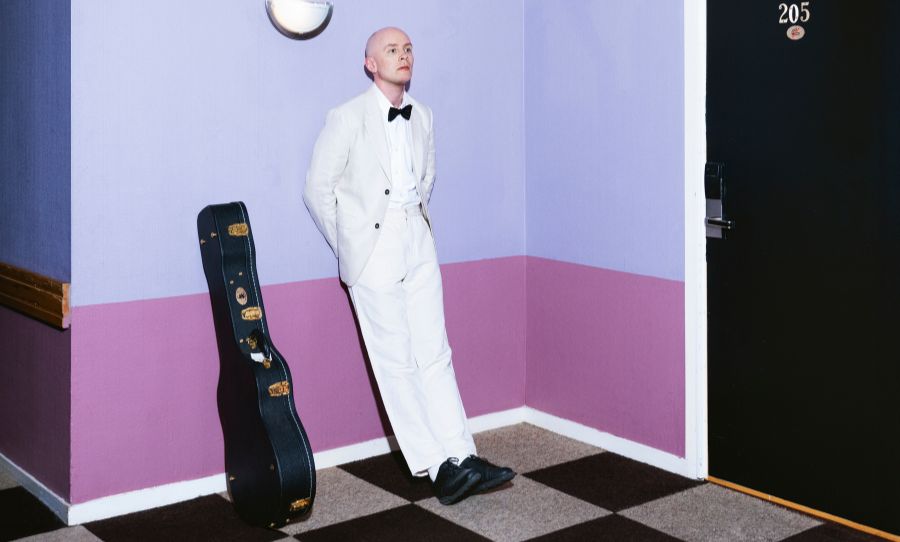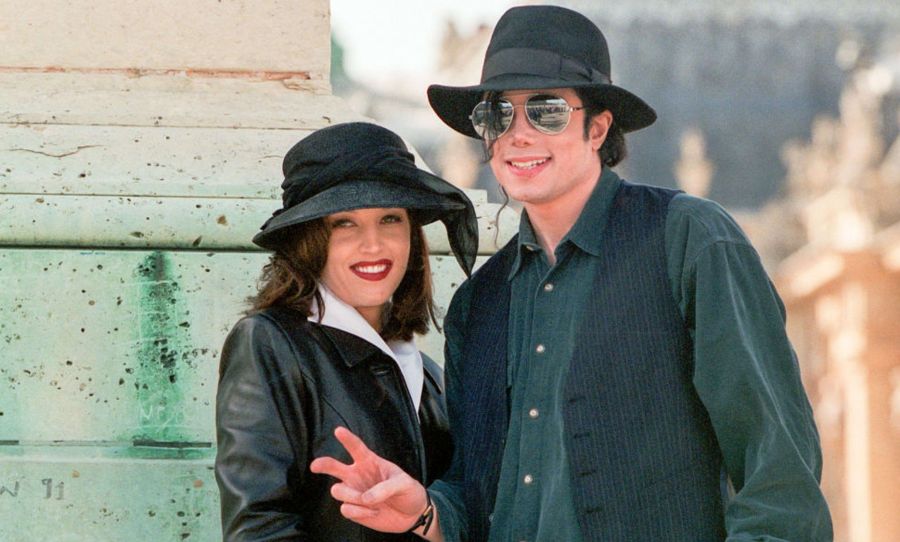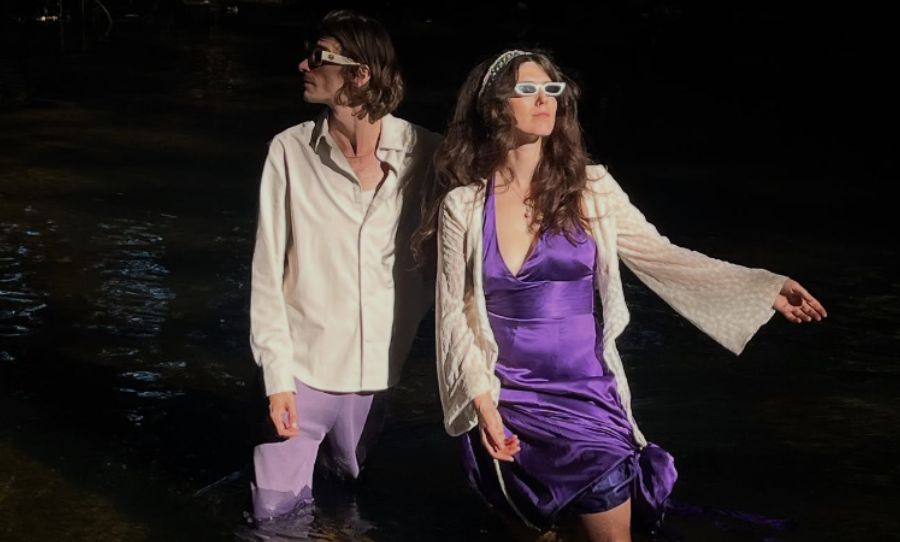I’d consider getting married just to hear Jens Lekman live in Sydney
Longtime Jens Lekman fans have been counting the days since he stole our hearts with Night Falls Over Kortedala, featuring gems likeinterv A Postcard to Nina and The Opposite of Hallelujah.
We last saw him in Sydney at the Oxford Art Factory back in 2018, and now the Swedish indie-pop maestro – pop’s most accidental wedding singer – is back with Songs for Other People’s Weddings, a new project following on from I Know What Love Isn’t (2012), Life Will See You Now (2017), and his 2022 reimagined albums The Cherry Trees Are Still in Blossom and The Linden Trees Are Still in Blossom.
Turning decades of performing at weddings into a novel-with-songs collaboration with acclaimed YA author David Levithan, Lekman reflects on Gothenburg’s underrated charm, the strange magic of weddings, and why love – both lived and imagined – still drives his music.
Will someone PLEASE book him in Sydney for their next wedding? We’re dying to see this one live.
HAPPY: What are you up to today?
JENS LEKMAN: I’m in Seattle to play a wedding and to continue my book tour with David Levithan along the US West Coast and Midwest.
HAPPY: Tell us a little bit about where you live, what do you love about it?
JENS LEKMAN: I live in Gothenburg, the Melbourne of Sweden. The underdog city that doesn’t get as many tourists and isn’t as well known as Stockholm but instead has all the good music. I’ve always loved the Melbournes of the world.
HAPPY: You’ve been an “accidental wedding singer” for over twenty years. How have those experiences shaped the way you think about love and music?
JENS LEKMAN: When music became ”something nice to have in the background” in the 2010’s, via Spotify etc, the weddings became an antidote to this for me.
It gave purpose to music again and made it feel special.
Just knowing that someone had chosen my song and me as a singer for their big day made me feel like my songs meant something more than being mood music at a Starbucks.
As for love, among my friends not many get married, so to have this insight into these other groups where people do get married has been fascinating.
It really is an insane thing to do in this day and age, to promise someone that you’ll be with them forever when everything and everyone seems replacable. And I admire that insanity.
HAPPY: What inspired you to turn your wedding experiences into a novel-with-songs collaboration with David Levithan?
JENS LEKMAN: At first it was a TV show that I was working on with a film director. Then, as so often with TV shows, it was put on the shelf before it had even been written.
But I couldn’t let go of this character, this parallel universe version of myself and I kept thinking of who I could work together with to write about him.
I’ve known David since he wrote a fan-mail to me in 2005 and while reading his books 19 Lovesongs, I realized that he could be the right person to write with.
The last thing I wanted to do was write something autobiographical, I find fiction to be a much better way to tell your story and this book is not the story of me but a dialogue about love and relationship between two unmarried, middle aged men.
HAPPY: How did the process of writing the album differ from writing the book? Did one inform the other?
JENS LEKMAN: Yes very much so, while writing the album I sometimes became intrigued with what happened between David’s chapters, what was it like for J and V to wake up hungover after the first chapter?
What really went through J’s mind in the end?
The album started taking detours into new alleyways and sometimes David would follow me into them and incorporate them into the book.
HAPPY: The character of J navigates love in both public and private ways. How much of your personal perspective went into his story?
JENS LEKMAN: It was very much a dialogue, sometimes a heated argument, between me and David.
He would write a chapter and I would say ”this isn’t believable, if someone treated me like that I’d break up with them instantly” or ”what do you mean you can be friends with your ex, isn’t that a form of self harm?”
And then we would go back and forth until we realized how differently we all see love. I recognize myself in some parts of J, others I think are a reflection of David.
What was important was not that it was a reflection of ourselves but that it felt true with regards to the story.
HAPPY: Collaborating with Matilda Sargren to voice V brought a new dimension to the album. How did that partnership evolve?
JENS LEKMAN: I did a tour three years ago where I played with El Sistema connected youth orchestras, the last one I played with was from Hammarkullen, the neighborhood in Sweden where I grew up.
Matilda was their lead singer, she had sung with them since she was 11.
I was instantly blown away by her voice and asked if she wanted to sing on the demos for these songs, with the idea that I would then replace her with a slightly more well known singer.
But after trying a whole bunch I realized that no one could do the songs like her, that maybe I had even written them with her voice in mind.
HAPPY:What do you hope listeners take away from the album if they haven’t read the book?
JENS LEKMAN: I just hope they enjoy the music. Then maybe that they start wondering why there’s so many stories about weddings.
Then who these J and V characters are. Maybe they’ll look up the lyrics and see that there is some kind of story. And maybe then they’ll pick up the book.
My favourite narrative concept albums are like this, like Watertown by Sinatra or A Grand Don’t Come For Free by The Streets.
You can enjoy them as music, as short stories or poetry but there is a reward if you start following the bread crumbs.
HAPPY: You’ve described this project as “a lovesong to lovesongs.” What does that idea mean to you personally?
JENS LEKMAN: I think music is the main character of the story.
For me it was as much a story about a relationship as it was about music itself.
One of the things that brought me joy in working with David was that he formulated my motivation for playing at strangers weddings.
Something i hadn’t yet formulated to myself. I do sometimes, like J in the story, write a song for the couples I play for and it is a joy but also a huge responsibility, to try to capture and reflect two peoples union from the outside.
But it is also a challenge that I love, that gives meaning to what I do. I love writing lovesongs.
HAPPY: We’ve seen you perform solo, and you absolutely nail it – are there any plans to take this duo setup on tour? Say back to Aus?
JENS LEKMAN: Well that’s awfully kind of you to say, thank you.
I would love to go back to Australia, it might be hard on this tour as I travel with a band to give justice to the complex arrangements of the album.
I usually can’t afford to bring any musicians to Australia.
But maybe some kind soul wants to book me for their wedding and pay me a decent amount so I can afford to come? If not, I’m sure there will be a solo tour later.
HAPPY: What makes you happy?
JENS LEKMAN: If there is one thing a wedding should symbolize it’s unity. In many cultures weddings have been a way to create peace between two groups of people, if someone is married to someone on the other side of the river then all those people are family.
I landed in the US a few hours after Charlie Kirk was shot and it felt like the whole place was boiling.
At least that’s what it felt like on the internet and TV.
But then I walked down the street and I saw a bunch of random people help a family of ducklings cross the street to get to the Puget Sound.
I saw a huge march for Gaza and heard a church choir sing songs for peace.
And at the wedding later I got to witness two very different families unite on the dance floor to Mr C’s ’Cha Cha Slide’.
That made me happy.
Listen to Songs for Other People’s Weddings below and check out Jens tour dates here.



